Sunday, 24 March 2024
Organic supermarkets may introduce a larger audience to sustainable organic produce and thus spare the environment, but do not necessarily help to reduce the amount of one-way packaging, save plastics. As a conscious consumer you will without doubt prefer non-prepackaged fruit and veges, available from all organic groceries, supermarkets and market boothes, and hand your bag over the bakery counter, making it verbally clear that you do not need a paper bag, to avoid paper waste when buying bread and rolls.
You're also safe if you restrict your shopping of dairy products, juices and soft drinks to returnable glass bottles. Some organic shops (such as Vollcorner) offer a small selection of wine in deposit bottles. Since 2021 we also have seen the gradual arrival of dry food, preserves and spreads in returnable glasses formerly only used for yogurts.
Starting in 2017 the more dedicated organic supermarket chains have been introducing measures to reduce packaging and allow customers to bring their own containers to fill with selected goods.
Unless stated otherwise all shops mentioned in this post will help you out with clean and empty reusable glass jars or organic cotton bags which you – depending on the shop – can either buy or lend if you forgot to bring your own.
Package-free food and household necessities
Early in 2016 the city's first crowd-funded vegetarian zero-waste supermarket Ohne ("without") opened its doors, followed by a
second branch early in 2019. End of June 2023
this became history: The insolvency, following the closing of other independent
owner-run package-free supermarkets earlier that year, left the Eastern,
Northern and central neighbourhoods without a place to effortlessly replenish
store cupboards without producing package waste.
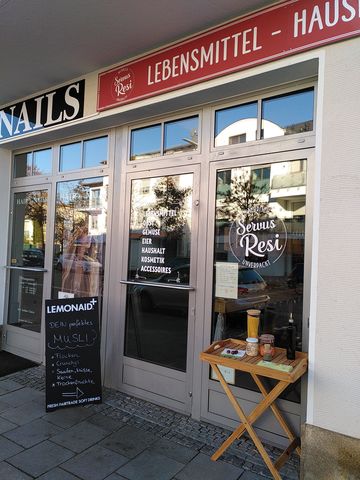
Gone the days of the pandemic spring and summer of 2020 when zero-waste groceries were blooming in town: Approximately at the same time as the Westend got its (now closed) neighbourhood shop, Servus Resi opened in Obersendling right before the lockdown in March 2020, in a non-descript middle of no-where near the Siemenswerke former industrial area. Don't let you fool by the uninviting environment at a noisy car road – what you'll find here is a busy neighbourhood gem nicely furnished in light wood, with a superb selection of dried herbs and spices aside the usual dry food, and a nicely arranged selection of household items. The greengrocery section is rather limited – local organic apples and potatoes in late autumn 2020 –, and there are no dairy or other food requiring cooling, but the shop offers both, liquid body care products and household chemicals from refill stations. Everything is supervised by the friendly shop-owner, Chrissy (not Resi) herself, and if you wish to get in touch with people from the neighbourhood take the burden to come here even from other parts of town.
In Laim Nebenan unverpackt ("package-free next door") followed in summer 2020. The latter is organised as a co-operative (though the location next to a co-operative bank is purely accidental) and sports a
small neighbourhood coffee place. They offer a very good selection of dry food, fresh fruit and veges, but less dried herbs and spices and no spirits. You can however buy wine and their selction of condiments and preserves in one-way glasses have the effect that you can do all the regular daily shopping here in one place if you don't come with more advanced expectations.
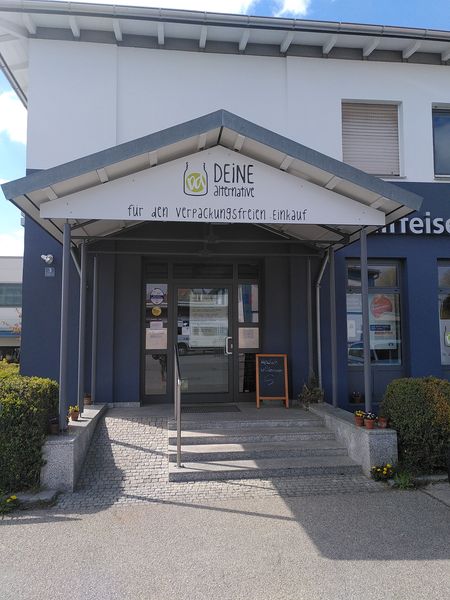
Half a year earlier, in January, 2020 another
co-operative, Deine Alternative ("your alternative") in Zorneding, opened on the premises of the former Raiffeisen co-operative bank, just a few steps from the urban train station.
When you get inside you will however immediately forget about its past as a bank, the shop is carefully and pleasantly decorated, with wooden furniture and equipped with a proper Italian coffee machine for a break in between. Most of the often local produce sold here is organically certified or at minimum sustainably produced, though it would be nice if conventional loose-weight products were clearly marked. In addition to the gravity bins and containers with dry food there's a decent selection of dried herbs and spices, sweets, bread, some confectionery, a small selection of fresh organic greens and veges, cheese and milk from the Nirschlhof organic farm (but interestingly enough no whole-meal flour or oils, vinegars or spirits by the litre). In a separate room you can buy toiletries, household chemicals and items supporting a zero-waste lifestyle. Everyone is welcome, but members of the co-operative pay less.
North of Zorneding, in the municipality of Poing, the co-operative
Bunte Bohne ("coloured/colourful bean") with its zero-waste supermarket cum cafe is facing a hard time as of June, 2023. Visit and support the place while you still can.
The neighbourhood of Trudering (a more than 1200 years old former village and suburb in the Eastern part of Munich) does not have a dedicated zero waste supermarket, but twice a month, on Tuesday afternoons, an indoor farmer's market dubbed Tante Trude ("Auntie Trudie") keeps popping up in the neighborhood associations' offices. Organic farmers offer local produce, and you can donate to the Trudelade project: home-cooked jam made from abandoned fruit trees in the neighbourhood (you'll get a jar as reward).
South-South-West of Munich, the city of Wolfratshausen (the endpoint of the S7 urban train) likewise sports a package-free shop centrally located at the Obermarkt market place: Ohnverpackt, another zero-waste shop opening within the corona lockdown in the spring of 2020,
is even certified organic. The few conventional products of regional origin are clearly marked as an exception. It does not only offer the usual dry food and household chemicals, but also a good selection of cheese and antipasti. What you won't find are fresh fruits and veges, meat and sausages.
There's a small day cafe, unfortunately all closed on Mondays.
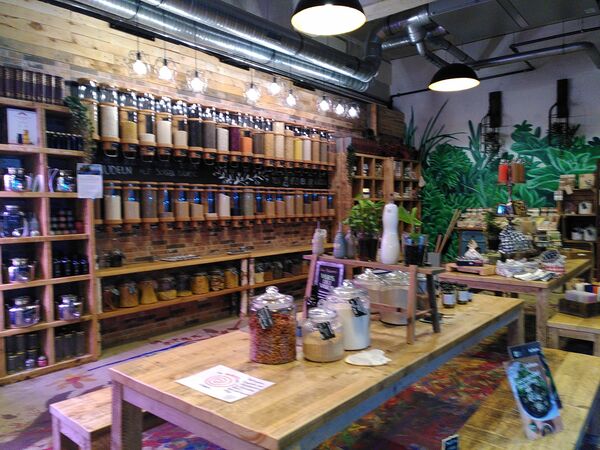
South of Munich, directly located at the S-Bahn station of Neubiberg the owner of the conventional Edeka supermarket opened a side project next door,
Hertscheck Unpacked which hopefully attracts people who usually wouldn't buy off the conventional supermarket tracks.
Although not marked most of the unpackaged dry food is organic – the shop assistant explained that since the shop itself isn't certified but fills the gravity bins and glass jars from bigger packages it isn't allowed to declare the products as "bio". There's also a good selection of loose-weight natural body care (both, in solid and liquid form) and household chemistry from brands I haven't found elsewhere. You can refill organic gin and regional (though not organic) whisky. The highlight of the shop are grow cabinets with special lamps where a good selection of herbs is grown, naturally free from agrochemicals. For city dwellers the place most certainly is worth
a bicycle ride (through the beautiful eco park Umweltgarten Neubiberg where an organic farmer's market is held on Thursday afternoons) or urban train tour even though the place has less liberal opening hours than the conventional supermarket next door.
Fun fact: The former premises of the Edeka supermarket now host a Vollcorner organic supermarket.
In smaller municipalities, (urban) train stations usually are the only public (and sustainable) transport hub and as such a natural place for zero-waste supermarkets. So I was glad to find a new (in 2022) co-operatively organised organic zero-waste supermarket in Unterföhrung, next to the S-Bahn train station. The shop dubbed
UFG (short for "unverpackt, fair, gemeinsam" – "unpacked, fair, together")
is open to everyone, with a 10 percent discount scheme for members.
It does not only offer dry food, condiments and household items, but also bread, rolls, cakes, dairy products and fresh, predominantly local fruits and veges. On Thursday afternoons you also may buy local organic meat and sausages, cheese and other fresh artisanal organic products from a mobile booth of the Tagwerk co-operative.
There's a small lunch cafe offering organic soups, quiches and sandwiches as well as cereal bowls, coffee, smoothies, tea and cake, all vegetarian, often vegan. Unfortunately you have to register with an app service to take your food with you in a returnable bowl or box, and nevertheless may have to come back to the shop to return it. So better bring your own boxes.
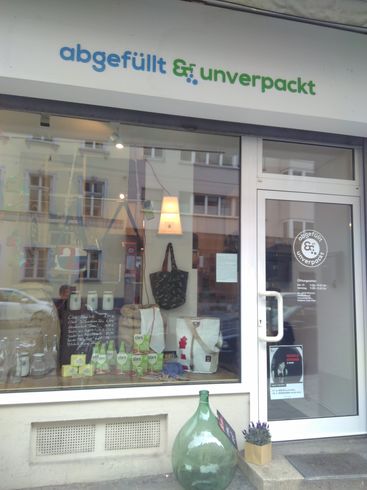
Plastic-free household
In March 2019 a tiny neighbourhood shop specializing in natural home cleaning opened in the Glockenbach neighbourhood: At Abgefüllt & unverpackt ("bottled and unpacked") the singer of the Munich-based band "Cat Sun Flower" warmly welcomes customers and passers-by and helps to (re)fill empty bottles with organic liquid household detergents. At the time of writing this shop was the only one in Munich selling washing powder by weight. In addition there are eco-friendly dishwasher tabs, body and hair soaps, fairly traded natural facecream in returnable glasses, towels, as well as upcycled and fairly traded bags and toiletry accessories.
About 20 years ago, Munich got its first – and to my knowledge only – organic department store centrally located a few steps from the Isartor: It consists of the city's first branch of the Basic supermarket chain with a self-service cafe on the ground floor and both, a self-service restaurant and a fashion and beauty store on the first floor. The latter,
Beauty & Nature, is a reliable source of organic clothes (with a focus on women and children), body care, home decoration, toys, dietary supplements and all types of sustainable household items including shoe shine, candles, seeds, cutting boards, or floor clothes.
Long anticipated, they started to offer refill for household detergents of the Sonett brand by the end of 2021, with a 10 percent discount. Since the staff is knowledgeable, friendly and helpful, do not hesitate to ask if you have any questions.
Supermarket chains
In autumn 2016 the local Vollcorner
supermarkets received an official permit by the Munich Department of Public Order (Kreisverwaltungsreferat) to fill customers' jars and boxes with
cheese, antipasti, processed meat products or cake. The Basic supermarket chain followed in summer 2017, while independent convenience stores often had done so anyway. What's missing are customers bringing appropriate containers or at least asking
the staff to fill their orders into returnable glass jars (Vollcorner, Lebascha and others) or stainless steel containers (Basic) provided by the shop itself. So be brave!
To avoid misunderstandings it is advisable to clearly point to your box (or ask for the deposit container) before placing your order at the sales counter and tell the staff to tape the receipt to it. Otherwise you may end up not sparing any waste: In the beginning the staff at the Basic butcher's disk would use the sheet of plastic-covered paper they'd usually wrap the purchase with to hand it over to you, along with the receipt taped onto the paper bag they otherwise would have used as outer packaging. In the mean time they got used to the procedure but were ordered to decline customer requests to buy meat this way. Since they started to provide stainless steel boxes for a deposit of 7 EUR there's however no excuse for one-way packaging here anymore. Artisanal organic butcher's shops will also fill meat into boxes you provide. The Herrmannsdorfer groceries (e.g. the one at Max-Weber-Platz) reward you with a few cents discount per saved packaging.
Until the end of 2022 Basic supermarkets had gravity bin dispensers for pasta, nuts, dried fruit, sweets, grains and more which all disappeared in the course of the company's
insolvency and take-over by the "teGut" chain. Package-free offerings at the remaining "Basic" branches are reduced to fruits and vegetables as well as food from the serviced bakery and butchers' counters.
The shops of the nation-wide operating Alnatura chain never offered refill dispensers. However, it has been increasing the range of products in returnable jars and bottles continously since 2021 – among others fairly traded nut butters, a number of dry products and even ketchup.
A small selection of dried fruits and nuts in refundable glasses as well as package-free toilet paper can be obtained from Vollcorner supermarkets. Their huge flagship store at Theresienwiese (with butcher's counter and lunch cafe) also experimented with a milk vending machine and a dedicated shelf offering all sorts of products in deposit glasses, but both efforts were discontinued due to low customer demand.
By the end of 2020 a number of conventional supermarket chains had introduced refill stations for dry food, too, but since you still have to do a lot of careful reading in front of the shelves to shop climate-friendly products, I won't mention them here, with one exception: the huge Tegut branch that opened in the Elisenhof shopping centre next to the main train station
in December 2020. This supermarket chain gives their customers a choice – all organic products are easily to recognise thanks to a light-green label on the shelves, and there's a great number of them in all product categories. Given the sheer number of products on sale the impressive refill rack at the left-hand side of the entrance aisle comprises only a negligible fraction of total sales, but it's a good start, and the best: All products in the gravity bins are organic. Come here for the biggest selection of package-free organic chocolate-covered sweets I've come across so far. There are grains, cereals, nuts, dried fruit, legumes and sweets, but no flour and surprisingly almost no pasta.
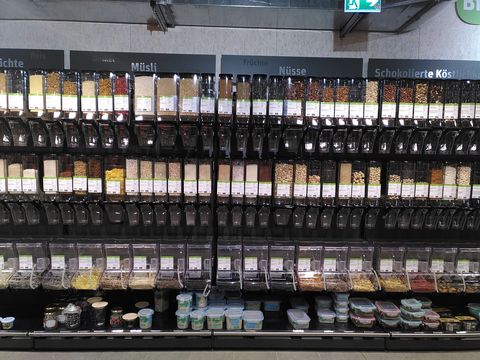
Although the supermarket has its entrance next to the Sunday-open (and if you ask me generally more pleasant) organic supermarket Biokultur in the Hauptbahnhof basement Tegut is closed on Sundays and public holidays as well as in the evening. When you have at minimum half an hour to change trains you will however reach to refill some of your dry food containers as long as you know how it works: Put your box onto the scales and choose "Tara-Bon". This will print a label. Fill the box and remember the product id on the lower end of the gravity bin. Put the filled box back on the scales and press the second "Bon" button beneath the "Tara-Bon" button. Now you will be asked to type in the product id. Scan the bar code on the previously printed label with the hand scanner, and there you go: A receipt with a price tag will be printed for you. Seal your box with this second label and hurry up to the cash counter.
Neighbourhood groceries
In Haidhausen the Lebascha neighbourhood grocery has been offering to fill all loose-weight products (cakes and bread, eggs, cheeses, olives, jelly gums and liquorice – note that the latter is not organic) in bottles, jars and boxes customers brought along. When the shop was taken over by the Ökoesel co-operative dispensers for grains, nuts and the like as well as household chemicals were added, and you can
buy all types of dried herbs and spices by the gram.
Ask for a deposit box in case you forgot to bring your own.
For home-made dried fruit stroll a few more steps down the street and see whether the Haidhauser Oase is open.
Household chemicals can be refilled at the Echt Bio Markt in Neuschwabing and at the Biochicco supermarket in the Au near Mariahilf-Platz. At the latter you can only refill original bottles of the Sonett label.
In Harlaching, the
independent Biowelt supermarket has a small zero-waste corner with dispensers for dry food, a good selection of loose-weight dried fruit and a dairy and butchers' counter where you can hand over your containers.
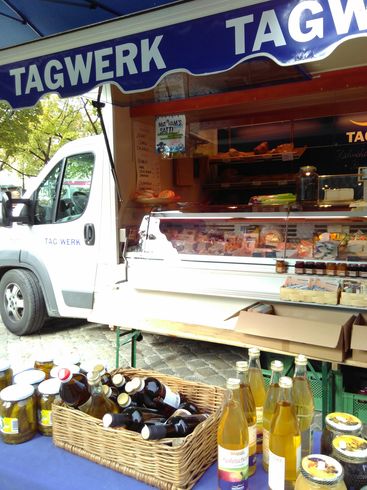
Farmers' markets
Once, sometimes twice a week farmers' markets are installed in many Munich neighbourhoods. Loose fruits and veges prevail here, and boothes selling organic produce (watch carefully for "bio" and "demeter" logos) will usually fill bread, cakes and pastries, antipasti, meat and dairy products into the containers you present. Notably at the boothes of the Tagwerk co-operative and the Hofbäckerei Steingraber you may be surprised to see that you're not the only one coming with her own boxes and jars.
On Saturday mornings you can find them next to the West-facing entry of Mariahilf church, in the neighbourhood of Au. Before the covid-19 pandemics all boothes (except the French fish monger) in the market block next to the church, right below the carillon, were organic,
but now it's no longer that easy. Therefore a comprehensive list: There are three organic market gardens (Biogärtnerei an der Isen alias Avanti Andi, Demeterhof Fahrenzhausen alias O'is bio and a third one also selling flowers and seedlings which you will immediately recognise when greeted with a friendly French accent). Put differently: Simply avoid the biggest greengrocery booth, "Helminger".
For meat, sausages, cheese and other dairy products there are the aforementioned two producers, and in addition the farm sale of Bergwinklhof Monigottsöd. The latter also offers a small selection of wine, but for good and knowledgeable advise on wines or non-alcoholic drinks to accompany a meal you'll better pay a visit to Uli Scheffler's organic wine trader's booth. While the juices are readly available in deposit bottles, returnable wine bottles are still very rare, and not used for high-quality wines.
If you feel adventurous on Thursday afternoons take the urban train S7 in direction Aying/Höhenkirchen-Siegertsbrunn/Kreuzstraße (or a bike ride) to the suburb of Neubiberg and pay a visit to the communal organic market on the pleasant premises of the Umweltgarten eco park, a true oasis within ugly suburbanity, with a small zoo, popular not only among kids. On Thursdays there's also an all-day market at Rotkreuzplatz. As on Mariahilfsplatz about half the boothes here are organic, though scattered all over the market area, with a cluster in direction Nymphenburger Straße.
Needless to say that the organic boothes on the famous Viktualienmarkt in the Munich city will happily support you when you make it clear that you want to use your own bags and containers. And the spring of 2021 did not only see the opening of an organic bakery in one of the solid market stalls in the northern part of the market, but also a tiny organic food shop for organic dry food grown and produced in the nearby Chiemgau region:
Satt und gut ("full and good") sells staple foods like grains, flour, eggs, honey and oil but also cookies, both pre-packaged and loose weight, partially from the smallest gravity bins I've seen so far. Note that this shop, unlike the market itself, is closed on Mondays
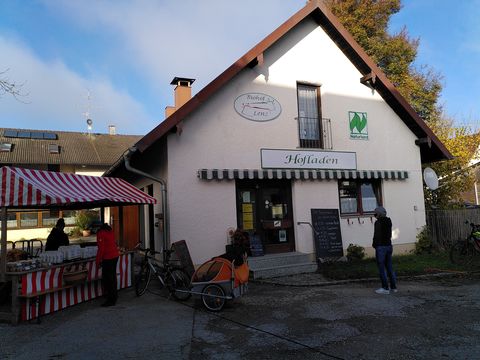
In Zorneding a small farmers' market is being held every Friday on the premises of the Biohof Lenz organic farm. Here you can buy local organic meat and meat products, cheese, bread, veges, and occasionally honey and bee products, wines and spirits. Although most stalls are organic there are a few exceptions offering conventionally produced specialities. The Lenz family's own farm shop keeps open at the same time and on Saturdays, but for buying their exceptionally good meat you should subscribe to their newsletter and order beforehand according to availability (you should be fast to answer). Unfortunately all the Lenz meat and sausages are vacuumized in plastic.
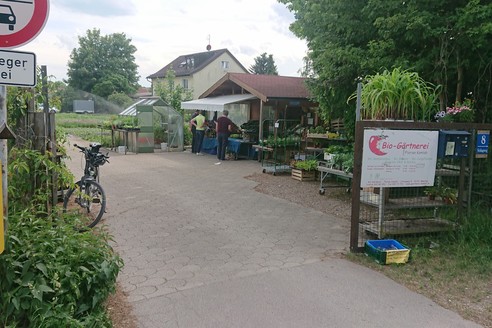
At the Western edge of town, in Pasing the organic market garden of Bio-Gärtnerei Kamlah has a farm shop open on Monday, Wednesday and Friday afternoons. You can not only buy salads and vegetables grown here but also organic seedlings for your balcony or garden patch. The farm has also a market stall at the Pasinger Viktualienmarkt which keeps open all days except Sunday offering a huge selections of organic fruit and veges, but no seedlings.
Tea shops
While coffee is readily available from
loose weight convenience stores, tea drinkers aren't well catered for: Usually you will find some tisanes and one or two types of black tea. Fortunately specialist tea shops still exist, and as they sell loose weight teas by the gram don't be shy and ask them to fill your tea box.
In the
Tee Gschwendner shop in the Asamhof backyard a few meters from the new pedestrian street of Sendlinger Straße this will work as long as the opening of your jar or box is wide enough for the shop assistant to fill it without touching it with her shovel. The franchise also sells conventional fare, so make sure to insist on organic quality – "Bio-Qualität" is the keyword. You'll find a decent selection of both, green, black and herbal teas, with and without aromatics. Bring a little time to stroll through the light and pleasant shop that has been at this place since the 1980ies, ask the assistant to show and suggest teas according to your taste and tell a little detail. When all your teas are filled into your jars you will be asked whether you fancy a tea sample, so it is smart to bring an additional small glass or jar.
Mind you that green tea doesn't store well in classic metal tea boxes as this material supports further oxidation processes.
In spring 2022 it turned out to be difficult to buy loose-weight organic flavoured tea as compliance to the EU regulation 2018/848 on organic products had not been established in time.
Coffee and food to take away
An increasing number of coffee places you may lend a Recup coffee cup for a deposit which you can return at any other shop participating in the retour scheme.
Some like the Neulinger bakeries will even give you a small discount for sparing the environment.
Most of the eateries reviewed here will fill your food into the boxes you provide for take-away as long as you make this clear before they start their usual routine which still means one-way packaging. Sushi to take away is available from Sushiya, and they will happily accept your bento boxes with your order.
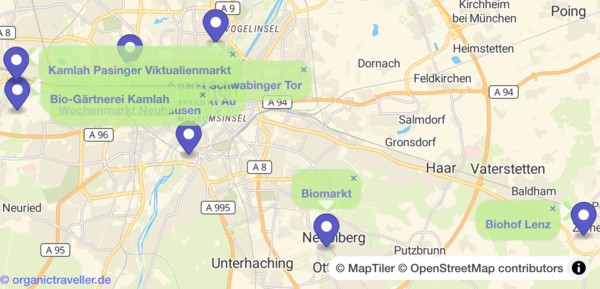
Closed
- Der plastikfreie Laden, Schlossstr. 7 (Munich's first zero-waste shop, also known as "Plastikfreie Zone", now online only)
- Mutternaturladen, Grünwalder Str. 244
- Mutternaturladen, Tumblinger Str. 45 (inside the Bahnwärter Thiel area
- Ohne, Schellingstr. 42
- Ohne Haidhausen, Rosenheimer Str. 85
- Naturverpacktes Westend Pur, Heimeranstr. 51a
- Evis – ab ins Glas, Pollinger Str. 11, Gilching
- Lela Lose, Freisinger Str. 3, Erding
2024-03-24 11:30:00
[Munich, Neubiberg, Erding, Gilching, Poing, Trudering, Unterfoehring, Wolfratshausen, Zorneding, Au, Haidhausen, Harlaching, Laim, Maxvorstadt, Pasing, Westend, organic, vegetarian, zero_waste, unverpackt, cafe, grocery, market, supermarkets, lunch, bakeries, butcher, tea, bodycare, household, sushi, wine]
Link

Sunday, 10 March 2024
To find a self-respecting restaurant or supermarket snack bar not equipped with a restaurant-size Italian espresso machine can be difficult, and even the tiniest organic corner shop will try to offer you ubiquituous Italian-style coffee drinks. Likewise you can have organic tea bag teas and infusions of usually decent quality. But for the modern nomad on the job, the afternoon chat with friends or the traveller in search of a undisturbed place for a break or observations, the dedicated coffee or tea house is a far more appropriate place to spent hours.
Common for all the places listed here that they are closed in the evening – usually around 6pm, some keep open until 8pm. Note that weekend opening hours may be even more restricted.
Viennese-style coffee houses
The headline is misleading – even if an increasing number of cafes see themselves in the tradition of Viennese coffee houses when it comes to the stuccoed interior, the dark wooden furniture, a selection of daily newspapers as well as the menu, they will usually serve Italian-style coffee drinks. The perfect place for breakfast and a coffee break at any time of the day, you will also be served lunch and snacks throughout the day. Expect however to order more of the deliciously handcrafted cakes than you initially intended to.
To my knowledge the only one left by the end of 2020 and my absolute favourite is the newly restored Cafe Reichshof in Haidhausen, covered in detail in my ice-cream post.
Oriental-style coffee
Since Iunu stopped serving Turkish mocca the only place offering responsibly sourced oriental-style coffee in Haidhausen is Saladins Souk with its rather irrational opening hours. If it is closed you may move next door to Erbils vegan Turkish eatery.
In autumn 2021 I noticed to my delight that these aren't the only mocca places anymore: The Icedate ice-cream parlour in Maxvorstadt started serving organic coffee, although the price tag of 2.40 EUR the mocca is rather stiff.
Italian style bars
Pop in, have a coffee, a chat, a sweet, and pop out again – the Italian bar is the hotspot of a neighbourhood. To my deepest regret its Bavarian incarnation is no more (landlord cancelled contract with the coffee roastery), but
in the middle of humming Viktualienmarkt market North of the crossing Reichenbachstraße/Frauenstraße there's Kaffeerösterei Viktualienmarkt, a vibrant market booth with bar tables under a roof. So even if the weather is bad and you're outside there's no reason to give up plans for an Italian style coffee drink made with sustainably sourced (though not organically certified), locally roasted coffee. The milk is organic and comes from traditionally working mountain farms in the Berchtesgadener Land district, packaged by the co-operatively driven Berchtesgadener Land dairy which, in 2017, banned the use of glyphosate for all its farmers, not only the organic ones.
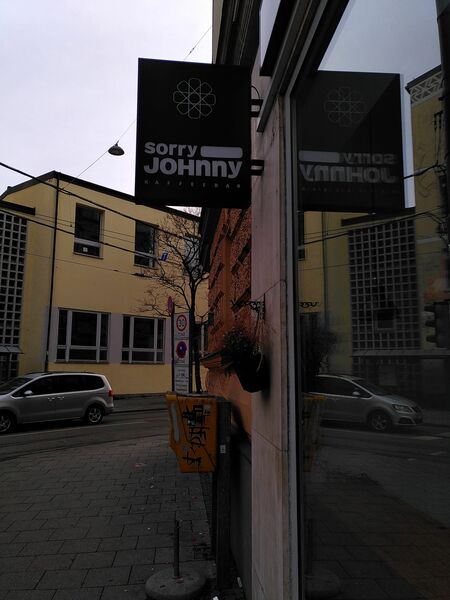
If you prefer your coffee with biodynamic (Demeter) milk head for the Sorry Johnny coffee bar in Haidhausen, conveniently located at the Wörthstraße tram stop. The place has quite unusual opening hours: closed on Tuesdays and Wednesdays, and open during the early evening
on Fridays and Saturdays. The bar replaced a vegan clean-eating spot in autumn 2021 which, for a while, prepared my favourite oat-based latte – a coffee preparation that's still available here.
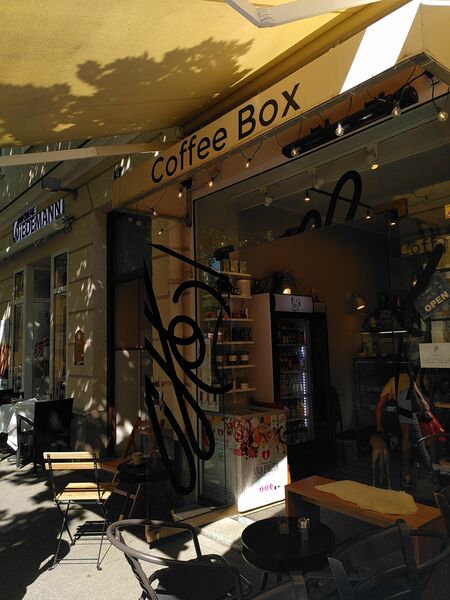
Without the heavy car traffic the area between Max-Weber-
and Wiener Platz could be a lovely urban hideaway, with singing tram tracks, an underground station (exhibiting Munich's first horse tram), pleasant shops, cafes and nearby parks. To escape from the agressive passive motorised mobility along Innere Wiener Straße jump into quiet Steinstraße and take a breath at the tiny
Coffee Box cafe. Although some of their coffee is roasted by
Merchant & Friends in Glonn, none of the
beans served here are organic. The milk, however, is organic, as is the ginger and pomegranate juices used in some drinks. For a refreshment in the summer heat have an
organic, vegan popsicle.
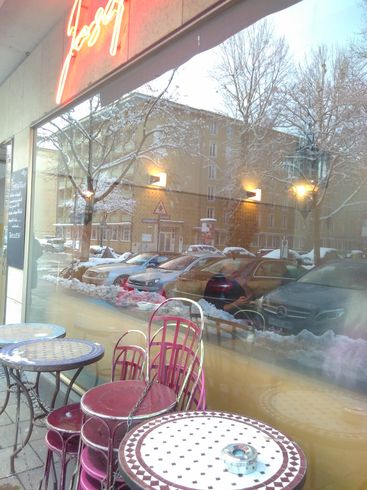
(Almost) fully organic
If all you want is a place where you do not have to fine-read the menu to pick out the organic items your options are limited to the afore mentioned Café Reichshof, near tram stop "Wörthstraße") – and to Café Josefina in the legendary neighbourhood of Schwabing with its bohemian past, a few steps from tube stop Josephsplatz.
A cosy day cafe serving Italian-style coffee drinks made with real milk or a number of plant-based alternatives it's not only worth a coffee but also a lunch break. Although nearly all ingredients are organic there are a few exceptions when it comes to the cold cuts used in Italian-style sandwiches. As early as half past seven the place starts serving both, vegan, vegetarian, and omnivore breakfast on weekdays, and since it is quite small it's advisable to reserve a table if you plan to step by on a weekend.
For a fully organic breakfast or coffee near Münchner Freiheit head for the small artisanal (and fully organic) Brotraum bakery happily catering for early birds. The breakfast menu is simple – but you can order additional items like eggs and cream cheese on top or ask for a freshly prepared sandwich or roll of your choice. Don't forget to bring your own bags and containers when you come here to buy bread, rolls or lunch items for take away – the owner is inclined to support your zero waste efforts.
In Neuhausen, about half a kilometre from Rotkreuzplatz a gorgeous health-food eatery cum cafe gROOSartig (a play on the word "gorgeous" and the name of the owner) opened in 2020, offering breakfast, lunch, and coffee breaks based on regional, usually organic, often fairly-traded ingredients. Although the menu is planned with a focus on healthy food the demand for sweets and cakes has resulted in an increasing range on cakes and tarts.
The place also has a small shop offering plastic-free artisanal household items.
Shabby chic and homely places
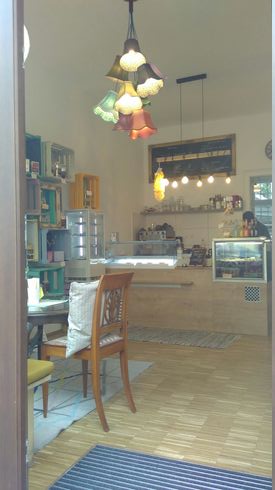
A small cafe of old, run as a social enterprise just a five minutes walk away from Rosenheimer Platz, Cafe Plaisir moved to a bigger and lighter venue in 2018 – and stopped using organic ingredients for their home-made ice-cream, chocolates, cakes and cookies. Still, tea and coffee drinks and a few more items are marked on the menu with a little heart denoting organic, and eggs – where marked – come from organic farms raising both, the hens and their cockerel brothers. Be patient and kind if the serving personnel does not respond immediately – the shop is a social enterprise run by longterm-unemployed persons.
Not far from Ostbahnhof station Kosy*s cafe promises to be "your second living room". As long as you have some tolerance towards cake stands filled with kitschy sweets guaranteed free from natural colourings and a decidedly vintage feel you can have an organic tea or soft drink, a coffee drink made with organic milk, organic eggs and cereals for breakfast or a hearty lunch often entirely made from organic ingredients in a leisurely atmosphere. The good thing is that organic ingredients aren't shamefully hidden – when it's organic they'll make it transparent on the menu. The bad news: their homemade cakes unfortunately are not organic, not even the eggs.
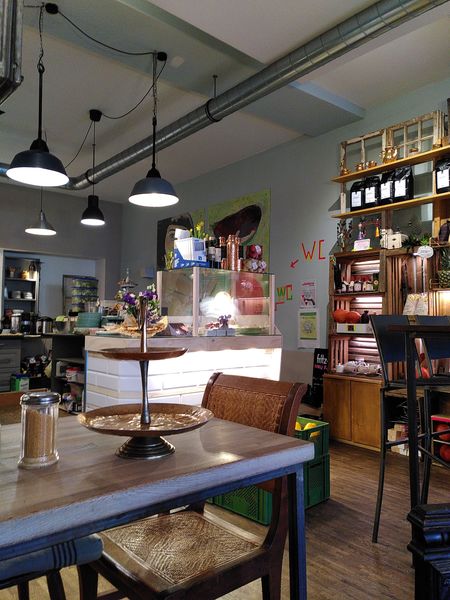
A few steps away, directly located at Orleansplatz cafe Iunu is a perfect place to meet a friend for a chat or to have a recreational coffee break including a chat with the friendly owner. Some of the coffee, the milk, the tea and a few staples used in the daily changing vegetarian and ayurvedic-inspired lunch set menu like agave syrup, rice and vegetable yogurt alternatives are organic, but unfortunately usually not the veges. The place was my joker for the best Turkish mocca in town, but unfortunately it is no longer being served due to marginal demand. With a small but carefully chosen (though not necessarily organic) range of delicatessen Iunu will also save you when in need for an unplanned last minute gift. On Saturdays the cafe is often unexpectedly closed due to arrangements, so check in advance.
Another cosy living room dubbed Zimtzicke is tucked away in comparatively quiet Elsässer Straße, only a five minutes walk from Ostbahnhof. All their teas, coffees, the milk and eggs are organic. Their lunch dishes, although mainly not organic, are tasty. However, when I enquired about the ingredients of the individual dishes on the menu, the staff wasn't able to tell whether they contained organic ingredients. The tiny place smells lovely of home-make cakes, some of them vegan. A perfect location to warm up after a winter walk in the city, and a pleasant retreat to welcome spring or to enjoy a summer day in the city on a table in front of it.
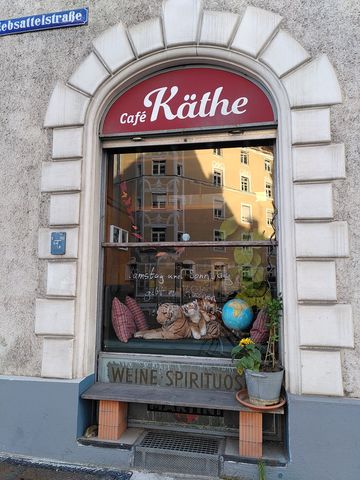
Another option to mingle with natives is a homely shabby chic neighbourhood cafe cum gallery in the neighbourhood of Au, on the Eastern shore of river Isar near Deutsches Theater. The audience of Café Käthe is mixed, coffee, milk, tea, rolls and cakes as well as most of the softdrinks are organic. They don't serve hot food, but you can have breakfast, sandwiches, cereals, salads and - of course – cake all day. Many but not all ingredients are organic, so ask if you care but be prepared that the service personnel isn't prepared to answer on the spot.
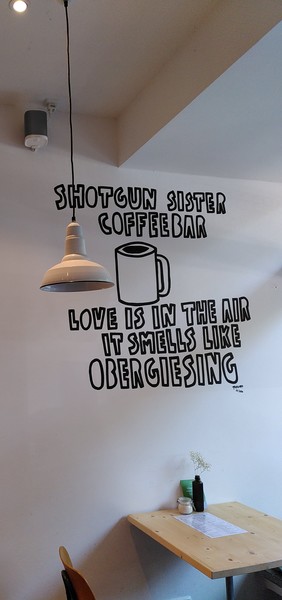
A crowded neighbourhood coffee bar in Obergiesing, Shotgun Sister allows you to meet people from the former working class borough which has been popular among both, students and families alike. All food including the cakes are home-made, with organic fruit and veges, often from local biodynamic agriculture. The cakes are fully organic. If you cannot spot the place at once watch out for the branch of the organic Hofpfisterei bakery chain which is located next to it, a five minutes walk from Giesing station. If you like splash out a coffee on an unknown – as the sister participates in the Hey campaign for fellow citizens in need. Needless to say that vegan and gluten-free options are readily available.
Big enough to almost guarantee a free seat for the visitor-by-chance is Cafe Katzentempel in the Maxvorstadt university quarter. You must however not suffer from a cat allergy as this rather special vegan place is inhabitated by six cats, and the once nice wallpaper on the wall with the scratch pole facing the entrance has already become rather shabby. Most of the softdrinks are organic as are all soy products and the cow milk (on request used for non-vegan coffee and tea-based drinks). The place offers an impressive range of organic nuts and grain milks to be ordered for your latte. The food and home-made cakes may include additional organic ingredients, although they aren't generally organic, just of local origin if possible. Students and apprentices are entitled special prices Tuesday through Friday, and free wifi is available. Depending on your table you may find the slightly aggressive sales presentation of the Katzentempel brand t-shirts disturbing – overall a place to either love or detest.
Further along Türkenstraße you'll find Mr. Ben – a small coffee cum snacks place offering (herbal) tea and soft drinks in organic quality. Unfortunately neither the coffee artisanally roasted in the neighbourhood of Giesing nor the milk and oat milk are organic.
There's a small selection of Italian-style piadina sandwiches and freshly home-made cake which occasionally may contain organic ingredients. The croissants used to come from an organic bakery a longer bicycle ride out of town but they were sold out (just like the veggie piadina) when I was there. Orders should be placed at the bar, but you will be served, and return to the bar for payment, preferably (and if the sum is smaller than ten euros only) in cash.
If you prefer strictly vegan places for a coffee break try Siggis which I reviewed here.
Self-service coffee house and deli bars
For the no-frills coffee with WLAN or on the go a number of nation-wide operating self-service coffee house chains serve Italian and American-style organic coffee often with organic milk and some more organic items like tea, soft drinks or fruit and nut bars. The market in Munich is quite volatile: The once dominating franchise San Francisco Coffee Company filed for bankruptcy during the covid-19 pandemics and does no longer have stores in Munich. Black Bean never expanded and survived, and Coffee Fellows is now ubiquitous, serving coffee at (among others) fuel and train stations.
Once booming MyMuesli chain, a German web order shop for organic cereals and porridges with offline branches throughout the German-speaking countries also had to close a lot of its shops after
a rapid, unhealthy expansion strategy.
On the Eastern edge of Viktualienmarkt, a few steps from Marienplatz you'll still find their flagship store which includes a decent coffee bar. No cakes to be had here but Italian style coffee drinks, juices, and of course mueslis, porridges and cereals in case you are a little hungry or in need for an organic breakfast. The major aim of the shop is of course to sell their products but for a quick WLAN or coffee break in the busy heart of the city the functionally styled place isn't a bad option.
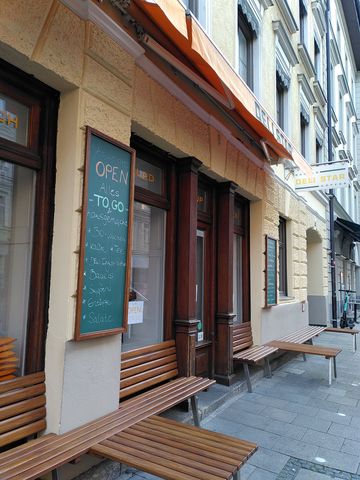
My favourite in this category is a small organically certified Munich-based chain: Deli Star brings the spirit of New York-style deli and coffee bars to town, but with a strong focus on the environment: No plastics here, all take away stews and salads come in returnable glass jars, and the coffee on the go in a Recup deposit cup if you don't bring your own. Not every ingredient in their bagels, sandwiches, stews and salads is organic, but all regular organic items are clearly marked BIO on the menu: the cakes (though not the muffins and brownies), most meat products, yogurt, Lemonaid and Adelholzener fruit and soft drinks. Other ingredients like veges and cheese may or may not be organic. The coffee isn't organic, but the milk comes in huge reusable containers from a local organic farm. In general they use a lot of products grown and produced in the region and/or from small-scale manufacturers. Both branches are located in students' hotspots in Maxvorstadt: near the University and at the entrance to the Englischer Garten park.
Mingle with the working crowd
Campus canteens and coffee bars frequented by those working nearby are excellent places to get in contact with locals – with the disadvantage of opening hours following office hours.
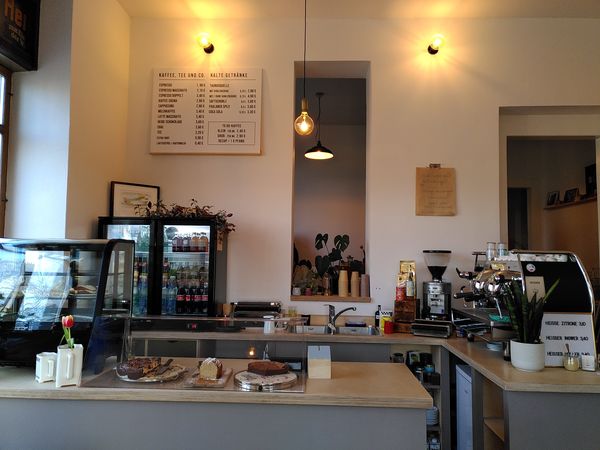
On the eastern side of the railway tracks of Ostbahnhof train station, a few minutes north of the newly developed Werksviertel you'll find day cafe Louka, a friendly no-frills place mainly catering for the office workers and craftspersons working nearby. What you get here:
coffee, home-made cakes and sandwiches, a
daily changing soup and main course, often vegetarian.
If you want to taste simple German everyday standards like Kässpätzle and Schupfnudeln, or the Russischer Zupfkuchen ("Russian pluck cake") cheesecake, this is the place. Not everything is organic here, but both, the coffee, the milk and the plant-based drinks, the eggs, often the veges and the meat are.
Steinhausen is most certainly not a neighbourhood you will have on your travel agenda, but if you come to the Berg am Laim urban train, bus and tram stop the coffee bar on the ground flour of the Süddeutsche Zeitung publishing house is nearby and open to the public. It offers organic and fairly traded coffee and organic lemonades at very competitive prices. Milk, soy and oat drinks are occassionally organic, but better check for the "bio" keyword on the packs as conventional industrial milk still prevails. The sweet and savoury snacks are of unknown provenance so you may prefer to ask. Salads and desserts are being sold in retour jars at a deposit.
If you wish to mingle with journalists, developers, printers and all those involved in the production of Germany’s most respected daily newspaper this is the place despite the surroundings.
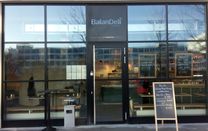
If you happen to strand in the urban desert of office blocks between the tube stops of Karl-Preis-Platz and Sankt-Martin-Straße head for the Neue Balan campus, a former industrial area where in the past Siemens produced semiconductors. Quite centrally you'll find Balan Deli, a modern yet comfortably furnished day cafe run as a not-for-profit company providing fair employment for an inclusive team of people with and without handicaps. The cafe was founded by the nearby inclusive Montessori school and designed by a Hamburg based artist. You can have a healthy lunch, partially based on organic ingredients, or simply an organic coffee, tea, wine or soft drink, often sourced from local producers, in a pleasant environment. The bread for the sandwiches comes from a local organic bakery. Unfortunately the service staff is not very knowledgeable (yet) about organic and sustainably produced food (when I enquired about the milk they told me it was organic although they actually use the cheaper conventional product of the Berchtesgadener Land dairy which also offers an extended range of organic dairy products), but was happy to ask the kitchen staff about the origin of the chicken in the Thai curry (which was not organic).
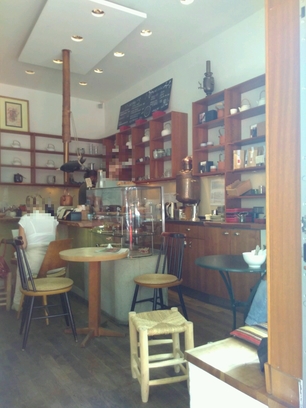
Tea houses
For those seriously into tea the ultimate target in town is Tushita Teehaus in the Glockenbach neighbourhood, near the Western exit of tube station Fraunhofer Straße (and a five minutes walk South of Gärtnerplatz). To taste their around 150 organic and often fairly traded tea and tisane varieties (which aren't exhaustively listed on the menu) can take some time, but you can buy them to take with you. With every order the staff will hold a microscopic tea ceremony for you, and hot water for a second extraction is served in a small thermos aside. In the past they often used too hot water for some of their delicate green teas resulting in a bitter beverage, but this fortunately had changed to the better at my last visit. In addition they serve small vegan dishes as well as yummy home-made cakes, all organic, and there's a Japanese touch to both, the decoration, the food and the subtle focus on Japanese tea and matcha. Consequently the place is frequented by visitors of Japanese origin as well as the occasional Indian gentleman or the German hippie or university professor reading their daily. Given how frequented the place often is there's a quiet, pleasantly concentrated atmosphere to it.
More to try
In the Westend, a few steps from Theresienwiese (and the Emilo cafe)
Café Gollier is a pleasant neighbourhood day cafe, popular for breakfast and hearty lunch. They promise to use regional, preferably organic products according to availability, but so far I have not had the chance to eat here.
Closed
The following places ceased to exist, although you still may find references to them on the web:
- Contains Coffee, Celibidacheforum
- Echt jetzt, Barer Str. 48 (web shop remaining)
- Emilo im Glockenbach, Buttermelcherstr. 5
- Emilo Westend, Gollierstr. 14
- Emilo am Odeonsplatz, Odeonspl. 14
- Emmi's Kitchen, Rosenheimer Str. 67 (vegetarian cafe cum eatery)
- Epique Raw, Max-Weber-Pl. 11 (vegan patisserie shop-in-shop)
-
Fritz Brotbar, Nymphenburger Str. 154 (bakery cum cafe)
-
Fritz Mühlenbäckerei, Müllerstr. 46 (cafe cum eatery, re-opened in 2020 as bread bar w/ show bakery)
- Himmelherrgott, Waldfriedhofstr. 105 (cafe)
- Die Kaffee-Küche, Weißenburger Str. 6 (cafe)
- Kafehaus Karameel, Nymphenburger Str. 191 (Viennese-style coffee house)
- Lolas Eckcafé, Metzstr. 37
- Kaffee Sonnenschein, Gietlstr. 17
-
San Francisco Coffee Company, Nymphenburger Str. 151 (cafe)
- San Francisco Coffee Company, Innere Wiener Str. 57
- San Francisco Coffee Company Ostbahnhof, Orleanspl. 5a
- San Francisco Coffee Company Riem-Arcaden, Willy-Brandt-Pl. (cafe)
- San Francisco Coffee Company Maxvorstadt, Türkenstr. 47 (cafe)
- San Francisco Coffee Company Odeonsplatz, Theatinerstr. 23 (cafe)
- Black Bean, Amalienstr. 44 (cafe)
- MyMuesli München-Pasing w/in Pasing Arcaden, Josef-Felder-Str. 53 (muesli shop)
- MyMuesli München OEZ w/in Olympia-Einkaufszenrum, Hanauer Str. 68 (muesli shop)
2024-03-10 21:00:00
[Munich, Au, Haidhausen, Maxvorstadt, Schwabing, Westend, Englischer_Garten, organic, coffee, tea, breakfast, lunch, snacks, fair, vegan, gluten_free, cafe, ice-cream, restaurant, American, Italian, Japanese]
Link

Wednesday, 21 February 2024
If you are familiar with Johann Sebastian Bach's Coffee Cantata from around 1735 you've heard about the Saxonian citoyens' love for coffee and a good piece of cake (if heading for a local speciality, try the Eierschecke cheese-cake). With a pinch of irony people will talk about the famous Saxonian "Bliemschenkaffee" ("(little) flower coffee") referring to the thin coffee or caffeine-free coffee substitute during World War II or in the households of the poor. The term refers to the fact that you could see the flowery ornaments on the ground of the (well, not in all cases) Dresden china coffee cup.
The Saxonian's love for coffee hasn't faded since, they still proudly refer to themselves as "Kaffeesachsen" (coffee Saxonians), and most organic supermarkets will serve you a latte or Italian style coffee, both to have on the spot, and to go (in this case don't forget your refillable cup).
There are however more pleasant places for a chat with friends, some reading or working time with a delicious cup of coffee.
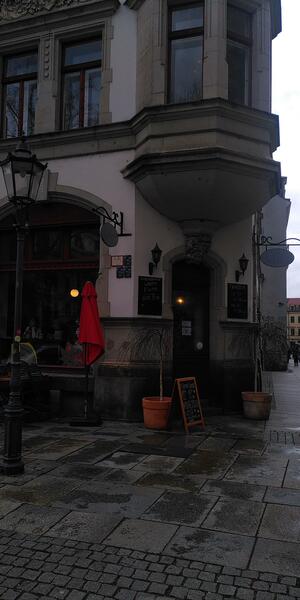
Neustadt
My favourite day cafe for about seven years, with friendly service and a huge display of gorgeous cakes and pastries, Die Kuchenglocke in Wilheminian Neustadt unfortunately closed in summer 2022. Run by the son of
Dresden's first (and to my knowledge only) organic bakers and one of the first organic ice-cream makers in Germany it revived the
tradition of Viennese style coffeehouses in the city. In 2022 he took over the
Heller bakery, and the cafe had to close. In March, 2023 it re-opened as Café Glocke, and apart from the interior decoration, not much has changed: You can still/again have (and buy to take out) cakes and coffee, and have gorgeous fully organic breakfast(all day long) and lunch. When the weather is nice take the chance to sit outside at the beautiful, comparatively quiet square around Martin Luther church.
The price for a (vegetarian) breakfast, sweet with pancakes or a croissant, savoury e.g. with hummus, roasted veges, bulgur and other spreads, is around 20 EUR but since the servings (especially of the savoury types) are quite generous, you may decide to share as long as you're not on your own.
On weekends it is advisable to order a table in advance as the place usually is quite crowded at that time.
The bad news: Effective February 2024 the place stopped accepting cash. Since the Oswaldz cafes have never been accepting payments without data tracking, the number of non-discriminatory organic breakfast and lunch places with a sense for data privacy are alarmingly diminishing in town.
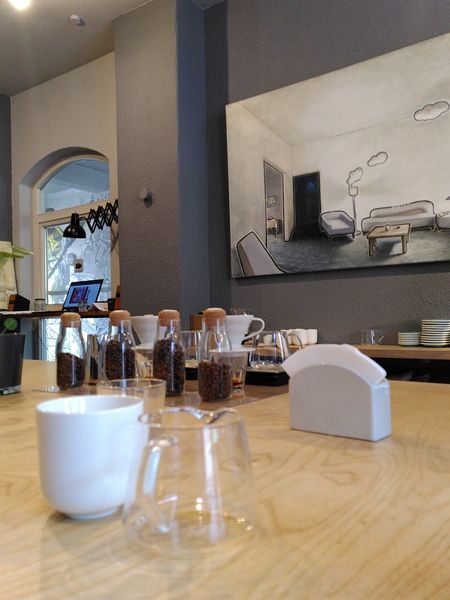
Not far away, on Bautzner Straße, you will find Phoenix Kaffeerösterei, a small-scale coffee roaster cum coffee bar furnished in coffee-coloured wood – ideal for the recreational sip of Italian style coffee. Their coffee is fairly traded, yet not organically certified, although they had organic coffee when they started up in 2006. The milk for a latte or New Zealand style Flat White however is organic. Mind you that their opening hours are quite restricted, usually to Fridays and Saturdays, but they often keep closed on Saturdays, too.
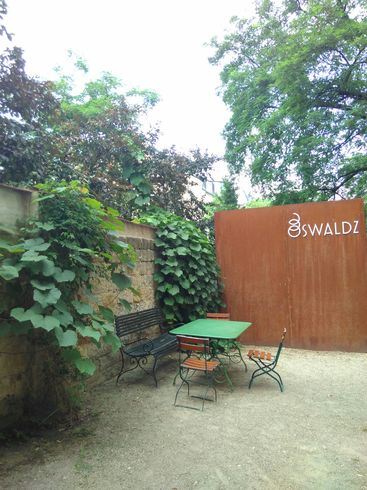
A ten minutes walk west, just before you reach Albert-Platz you can taste the Phoenix coffee all week long at the Oswaldz, a crowded coffee house cum gallery run by an ambitious young team. Before you sit down fetch a service number and put your order at the bar where you can choose from an impressive list of coffee drinks, among others a galao (coffee and milk frozzed together) or a gibraltar (double espresso macchiato). The milk they use is locally sourced and organic. You can also have a sandwich or cake partially made from organic ingredients – eggs and cottage cheese are organic, flour and fruit are not, and since the friendly staff happily answered my questions I'm sure they will equally friendly answer yours. During the warm season they open a pleasant backyard for their guests.
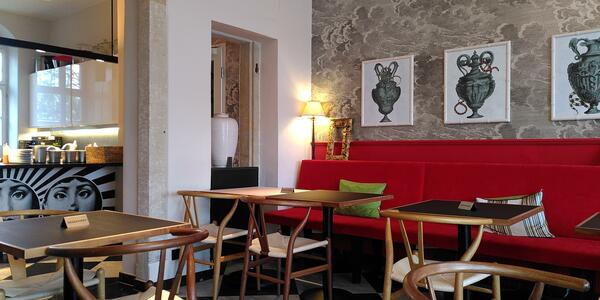
In 2023 Oswaldz rented a second shop next door and turned it into
serviced Oswaldz Breakfast Place.
All food for both, the cafe and the breakfast restaurant are prepared in its open kitchen while the coffee drinks are made by the baristas at the cafe. The menu is the same for both places as is the privacy-unfriendly decision to refuse payments in cash.
During the warm season there's a third Oswaldz place, the
Os2 – Café am Fluss.
Unfortunately there's no organic coffee place inside the Bahnhof Neustadt railway station, but if you have sufficient time you may leave the station building at the rear (Northern) entrance and head for the friendly self-service cafe cum bistro of the VG supermarket Friedensstraße for both, breakfast, lunch (try the hearty Soljanka soup if available), a snack, coffee or travel provisions.
Old town
Facing Kreuzkirche on Altmarkt with its white-washed interior one of the few places where the wounds of the Anglo-American bombing by the end of World War II still are visible you will find one of Dresden's first organically certified eating places, cafe cum restaurant Aha. Some years ago they quite controversely decided not to prolong their certification in support of uncertified local farmers following organic or near-organic principles. More than 75 percent of the ingredients they use are still organically certified but they stopped (probably enforced by law) to make this transparent, so you have to enquire on specific ingredients if you care.
The cafe itself is equally popular among students, families and NGO groups. Its walls frequently serve as a gallery for local artists, and the daily menu often reflects and extends the exhibitions. The list of coffee drinks is long, ranging from oriental and Indian inspired spiced coffee to the ubiquitous espresso. If you prefer a cold drink it's alleviating to know that sodas are served with paper instead of plastic drinking straws. The cakes are delivered by the Heller family, but you can also enjoy hearty home-made meals throughout the day (til late), or simply help yourself at the salad bar located under the stairs. Breakfast is being served from 9 am. In the basement there's a well assorted
fair-trade shop
which cannot follow the restaurant's liberal opening hours and is closed in the evenings and on Sundays.
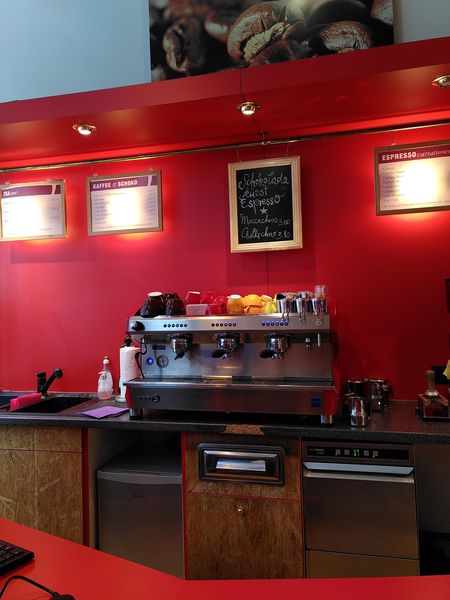
If you have to spent time in the vicinity of Dresden's central train station, Hauptbahnhof, pay a visit to another fair-trade shop, the Contigo at the Southern end of Prager Straße. Inside the shop there's an organic coffee bar, perfectly suited for the quick espresso in between, or while you're shopping for gifts, fairly traded artisanal work like bags and jewellery, tea, chocolates or coffee. They do not serve food, so you shouldn't come hungry. If you prefer an unconventional coffee drink opt a coffee based lemonade dubbed "Selosoda".
When the Contigo store is closed ignore the Starbucks branch at Wiener Platz and turn
instead to the
Haferkater porridge cafe facing it. The Berlin-based franchise concept can be found in several German main train stations by now, and the one in Dresden is open on weekends and generally until 8pm. While all prepackaged Haferkater products are organic no promise is made when it comes to the fresh food and drinks, so you'd better ask. Also, ask for returnable cups and bowls if you don't bring your own.
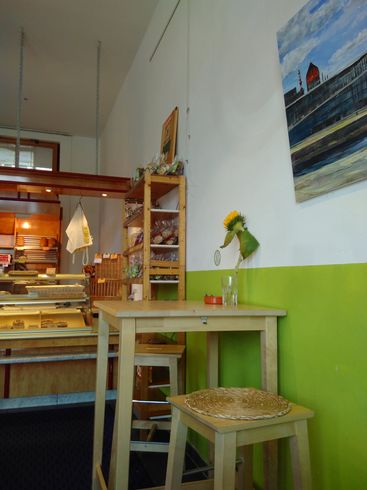
Dresden-Mitte
Not far from Bahnhof Mitte train station and the College of Music the organic co-operative VG runs a self-service Bistro & Backladen – the bistro to the left, the cafe to the right of the entrance. While the lunch is prepared in the open kitchen of the bistro right at the spot, the bakery shop simply sells the cakes (and bread) from local organic bakeries both, to take away and to eat right here in the pleasantly decorated shop room prided with pictures of local artists. Unfortunately the coffee comes from a smale-scale automatic machine – no real enjoyment, but drinkable due to the good ingredients.
While the bistro closes at 7pm on weekdays the cafe operates until 8 pm, but choice will be limited the later you'll come.
Near the Blaues Wunder bridge
A visit to the finest bridge in town, the Blaues Wunder ("blue wonder") steel construction can easily be combined with a visit to the arguably finest Viennese-style coffee house in town, the Café Toscana. Observing the bridge and the river you can sit in the winter garden having an organic coffee drink or tea. Your organic latte will be poured together at your table. While a selection of soft drinks and wines, the milk and breakfast eggs are all organic none of the gorgeously looking cakes and confectionery to be ordered from the sales desk are, at least not fully (enquire about what's tempting you). The history of the coffee house named after a Saxon princess customer dates back to the end of the 19th century. Since its re-privatisation after Germany's re-unification it has been run by the Eisold family, a local baker's family now in its third generation.
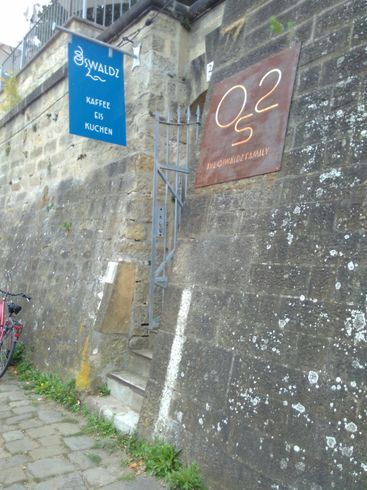 Crossing the blue wonder bridge you'll reach Körnerplatz, and if you fancy a stroll along the river shore, turn left into historical Körnerweg which leads you towards the city centre along the embankment. A 15 minutes walk on the way you'll find Os2 – Café am Fluss, a summer cafe run by the Oswaldz owners serving coffee drinks with organic milk, organic soft drinks and cakes to passers-by on weekends during the nice season. Most seats are located outside providing a beautiful view over the river and the city's silhouette. As at Oswaldz order at the bar inside, find yourself a seat, wait to be served and pay before you leave. The bar room also serves as an art gallery.
Crossing the blue wonder bridge you'll reach Körnerplatz, and if you fancy a stroll along the river shore, turn left into historical Körnerweg which leads you towards the city centre along the embankment. A 15 minutes walk on the way you'll find Os2 – Café am Fluss, a summer cafe run by the Oswaldz owners serving coffee drinks with organic milk, organic soft drinks and cakes to passers-by on weekends during the nice season. Most seats are located outside providing a beautiful view over the river and the city's silhouette. As at Oswaldz order at the bar inside, find yourself a seat, wait to be served and pay before you leave. The bar room also serves as an art gallery.
Leubnitz
If you ever happen to strand somewhere between the tower blocks of Prohlis and the Technical University, take the time to visit the city's only organic bakery and confectionery, the Bio-Bäckerei und -Konditorei Heller mentioned afore – if only to have a wonderful ice-cream on the go. When the weather is nice they also have a small outdoor terrace for you to have a coffee and cake or snack.
Although the bakery is open on Sunday mornings it's closed on public holidays.
Closed or no longer offering organic options
The following places ceased to exist, although you still may find references to them on the web:
2024-02-21 19:30:00
[Dresden, Neustadt, organic, coffee, breakfast, lunch, snacks, fair, cafe, ice-cream, restaurant, confectioners]
Link

If you are looking for pioneers in the German zero waste movement you'll find one of them in Dresden's Neustadt neighbourhood:
Bring a selection of glasses, containers and bags and stop by Lose ("loose-weight"), a cosy zero-waste corner store in Böhmische Straße. Unlike other package-free supermarkets this one does not only sell dry food, natural body care and household chemicals but also offers veges and has a cheese counter. Although most of the products are organic some are not, so you might want to check the labels on the suspenders for the bio keyword or ask.
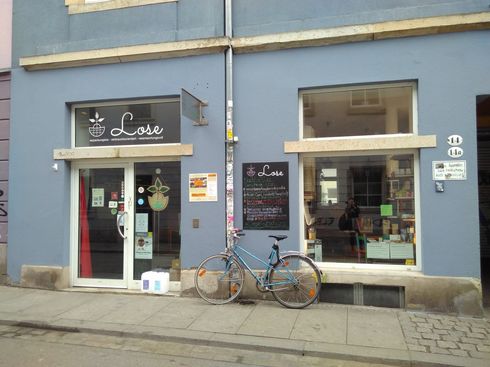
The interior of the shop was refurbished and is now much lighter and seems spacier than before. The reason for this is that the coffee corner which had been there before the corona pandemic has decreased and the serviced counter for bakery products, cheeses, antipasti and coffee moved from the entrance area to the backpart of the shop. Mind you: like other package-free shops Lose does not have an illuminated window front, so be brave to try the door handle – the place may look quite dark even when open.
Supermarkets with zero-waste stations
Moreover all shops of the co-operatively organised local wholesale chain VG Biomarkt offer a good selection of loose-weight organic dry goods (in addition to an abundance of often locally produced fruit and veges and dairy products and drinks of all kinds in returnable glass bottles).
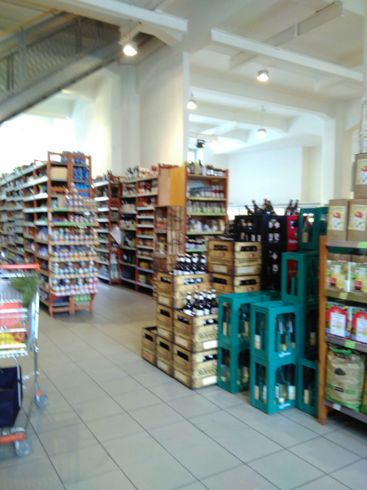
Their main shop is located near
Bahnhof Mitte train station, an entire organic warehouse on the premises of a former newspaper printing plant. Standing back from the main street the first floor is occupied by an organic convenience store supporting your zero-waste efforts. On the second floor there's a well assorted organic fashion store mainly for babies, children and women, with a section offering organic body care, household chemicals, sustainably produced toys, stationary and more.
For members prices are lower, but the shop is open to everyone.
On weekdays the self-service bistro directly facing the street offers delicious lunch (only snacks on Saturdays), and there's a cafe cum bakery shop featuring young local artists.
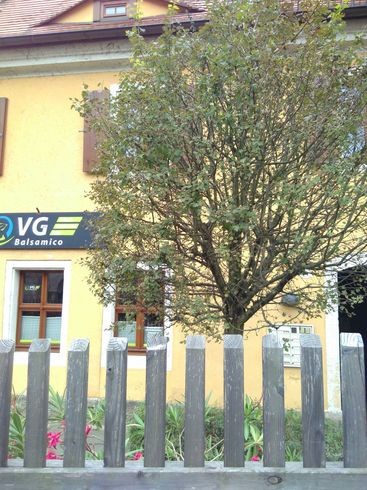
VG Biomarkt also has branches in the neighbourhoods of Neustadt (Hechtviertel), Striesen, Johannstadt, Strehlen, and Loschwitz,
Mind you that the one in Striesen, at Polandplatz isn't easy to find: Opposite the triangular park there's a driveway which one can easily miss as no sign at the entrance points to the shop. Be brave an move past, you'll find the shoü at the right hand site.
If you want to return empties, find the appropriate crate in the entrance area, pin down its code, tell the cashier and put the glass or bottle at the appropriate place.
The Loschwitz branch dubbed VG Balsamico is conveniently located
opposite the downhill station of the cable-run suspension railway ("Schwebebahn") next to
Körnerplatz at the northern end of Blaues Wunder ("blue wonder") bridge.
Opening hours and assortment (of loose-weight products as of products in returnable glasses) vary depending on the size of the market and the neighbourhood. However, all VG markets offer free drinking water refill stations and you can book cargo bikes to transport your purchase home free of charge.
While many organic groceries were closing, the Verbrauchergemeinschaft opened a new large supermarket with attached self-service restaurant cum cafe in 2023: The
VG Friedensstraße offers and abundance of loose weight and unpackaged products. Want to shop products grown or made in the vicinity? Watch out for the green "RP" ("regional partner") logo.
While these local groceries were early adopters a number of nation-wide operating organic supermarket chains have been following. In Dresden the two remaining branches of the Berlin-based supermarket chain Bio Company introduced dry food suspenders for use with your own jars.
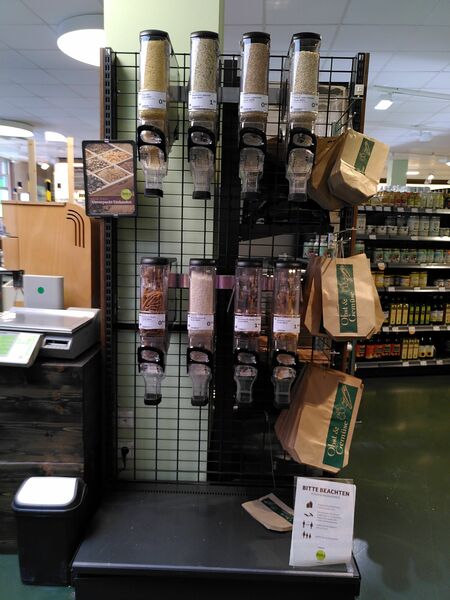
In 2021 the Denns Biomarkt was the first branch of this chain where I found a dedicated shelf with fairly traded dry food in retour glasses and a few gravity bins with nuts, seeds, rice and noodles. A start at least, although I have my doubts that this small selection will be sufficient to nudge people towards the extra effort it takes to bring along glasses and jars.
Without offering gravity bins the Vorwerk Podemus farm supermarkets supports package-free efforts, too: Hand over your own clean boxes and bags when buying meat and meat products, cheese, bread, rolls or cake from the services counter, and prefer returnable glass bottles and glasses when choosing jogurt, honey and jams.
Farmshops and factory outlets
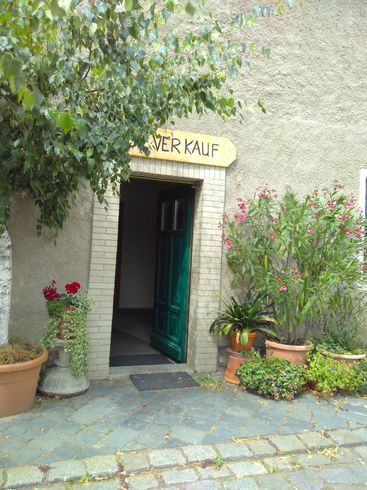
When you take the Elberadweg bicycle route on the southern shore in direction Niederwartha you'll pass a nice old farmyard, the organic Bauernhof Franz in Niedergohlis. It runs a subscription scheme – phone in or e-mail your order until Wednesday and collect it from the farmshop on Fridays and Saturdays, but if you happen to step by on one of these days and there's someone around you may be able to buy vegetable oil and perhaps also potatoes or other produce from the farm. But of course, shopping their farm products from one of the VG supermarkets might be easier.
In 2022 Vegannett, a Weißer Hirsch-based producer of vegan spreads, started filling products in standardized returnable deposit glasses which
you can buy directly from the manufacturer on Wednesdays.
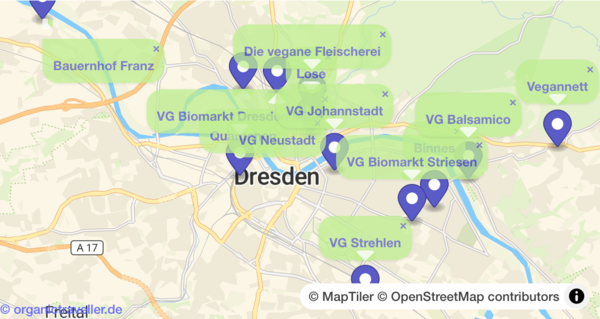
More to try
For more vegan alternatives to cheese, meat and sausages head for
Die vegane Fleischerei in the Neustadt. January, 2023 a vegan "butcher shop" opened here, and they assured me that all of their products are made from predominantly organic ingredients.
They also offer ready-made "meat" salads and soups, and I'm looking forward to visit the shop in person. Don't forget to take boxes and jars with you.
Closed
2024-02-21 04:00:00
[Dresden, Neustadt, organic, coffee, vegan, zero_waste, unverpackt, cafe, grocery, market, supermarkets, bodycare, household, hemp]
Link

Sunday, 04 February 2024
The easiest way to reduce waste is to buy directly from artisanal producers. So far all (organic) bakeries
have been willing to fill my purchase into the (obviously clean)
cotton bags I present for years, and – the times are changing – most shop assistants seem to be
used to the concept by now. Providing a container for cakes and pastries (or meat and cheese) may occasionally be met with a raised eyebrow, but when explained, most shop assistants comply, sometimes clumsily, with this request.
Butcher shops
Munich still has a traditional butchers row on Viktualienmarkt, but unfortunately none of these shops is certified organic. And unlike in Berlin, I am not aware of any artisanal organic butcher start-ups in town (yet).
Nevertheless meat lovers will be happy to learn that the city, home of Weißwurst sausages and Leberkäse, still has an independent organic butcher shop: The Biometzgerei Pichler in Haidhausen does not only offer these Munich specialities to buy home or to eat on the spot but will happily fill your boxes with all kinds of meat cuts, sausages, cured and processed meat (both, German and Italian style), including tongues, ox tails, offal and other low-graded parts of the animals, allowing you to follow the nose-to-tail principle. They also have a proper cheese counter and offer lunch (and warm snacks) on weekdays.
In the Maxvorstadt, the family-owned butcher runs the meat counter within the Landmann's supermarket. This one offers lunch items for take out, too, and often has pickled herrings and other traditional German fish preserves, from sustainable sources. Note that its opening hours are shorter than the supermarket's.
To my knowledge Pichler is the only dedicated organic butcher shop in town. Other organic butchers from the region either run their own farmer's supermarkets
(Herrmannsdorfer) or mobile boothes on farmers' markets (Tagwerk). Their products are readily available in organic supermarkets, too.
You may also buy meat and meat products directly from organic farmers: either from
a market booth or from their own farmshop.
And last but not least: Some organic butchers sell their fare through other market traders like the Hofbäckerei Steingraber.
Bakeries
For bakeries the picture is much more versatile: While older surviving organic bakeries in the city have been growing in size, built bigger workshops and centralised production, a new generation of artisanal bakers revived the traditional concept of a combined bakehouse and shop.
Here you can buy bread and rolls still warm from the oven, and often even catch a glimpse of the bakers at work.
Direct trade at farmers markets probably is the most social option: Market traders are ever so happy to strike up a brief conversation.
The easiest way to tasty organic German (sourdough) bread and rolls is to find one of the numerous branches
of Hofpfisterei ("Baker with appointment to the court"), with a history dating back almost 700 years and about 150 shops in Bavaria (plus a few in Baden-Württemberg and Berlin) likely to be
the biggest organic bakery (chain) in Germany. Much of the baking is done by contractors, and
while
the company is transparent about their production standards the question "Who made my bread?" remains unanswered. Given the sheer number of Hofpfisterei shops in Munich, I only
list the ones open on
Sundays.
Compared with this giant all other organic bakeries are dwarfs with no more than a handful of shops. Coffee-lovers better stay away from the coffee at Hofpfisterei branches, but the automatic coffee machine (run on organic milk and coffee beans) and one or more high tables for a quick lunch or snack are standard facilities in all bakery branches as are returnable coffee mugs if you insist on a coffee drink to take with you. Your own mug will be accepted widely by now, at least as long as it is clean.
The Augsburg-based family-run
Bäckerei Schubert is running two owned shops within Vitalia health food shops, one of them next to the Viktualienmarkt, the other in Laim.
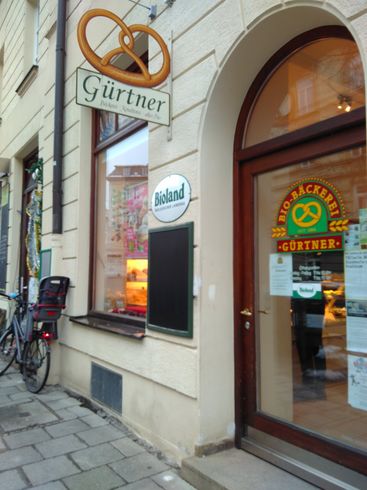
The Munich branch of the Dachau-based family-run organic bakery Gürtner is located opposite the Lebascha grocery in Haidhausen. They mill the flour slowly using a Zentrofan wholefood mill resulting in wholemeal croissants tasting fresher and almost as light as those made from pastry flour. For lunch the bakery offers the standard that can be expected from Munich bakery shops: readily prepared sandwiches or "Butterbrezn" (buttered pretzls). There's a second Gürtner branch on the Pasinger Viktualienmarkt near the Pasing train station.
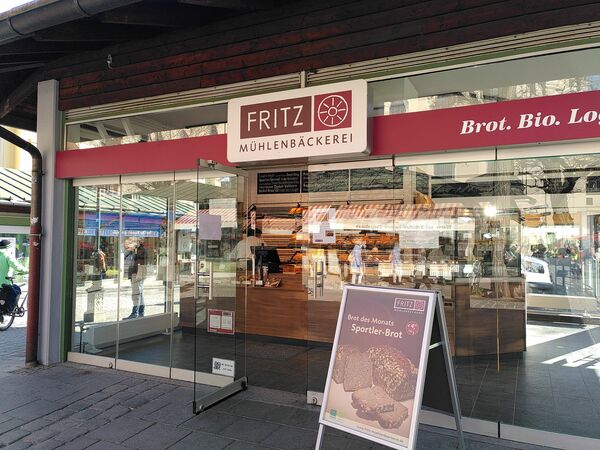
With roots in Munich, and since 2020 back baking in town, Fritz Mühlenbäckerei
will not only provide you with fresh
bread, cakes, and rolls on Sundays: The shop in Haidhausen where everything started does no longer act as a bakehouse, but it still sports well-assorted fridges and shelves with all organic food you may have forgotten for the Sunday breakfast. In spring 2021 the bakery took over a market booth in the Northern part of the Viktualienmarkt, next to Heilig Geist church which however is closed on Sundays.
To avoid food waste, if you are on a small budget and as long as you aren't out for a special type of bread or roll I recommend the Fritz bakery's yesterday's bread shop, Zweitbrotladen, in Haidhausen. However, this small shop has a disadvantage: by the end of its quite restricted opening hours you may find that everything you fancy has been sold out.
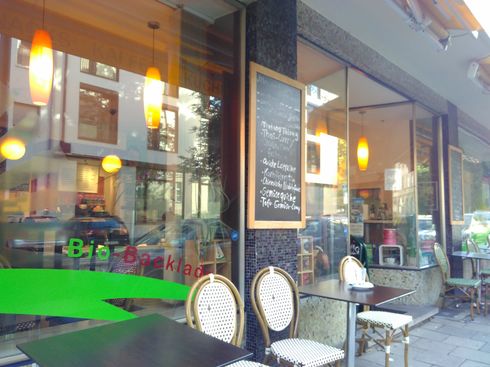
A short walk from Sendlinger Tor, within the hospital area, you'll find Bio Backs, an organic bakery store where you also can get organic coffee drinks, tea, hot chocolate and snacks. Unfortunately the Asian lunch served here is not organic. Only the butter, the flour used in savory quiches, sugar, milk, soy drink and vegetable broth are promised to be organic. Pro-actively insist on your own bags and containers when you buy to take with you. Mind you that the shop closes quite early in the afternoon.
All of the aforementioned bakeries (except the Hofpfisterei) sell good home-made cakes. But if you are out for the art of pastry and tarts there's one
bakery not to miss, a bakery not only founded within the city boundaries but still
a true native: The Brot- und Feinbäckerei Neulinger with its gorgeous Café Reichshof and four more shops.
While the Fritz bakery relocated its main factory to a new-built complex in the Bavarian municipality of Aying and only has a small artisanal bread bakery in town, the Neulingers are baking everything in a light and open, pleasantly humming workshop in Sendling, and all of their shops are open both, on Sundays and most public holidays (except January, 1).
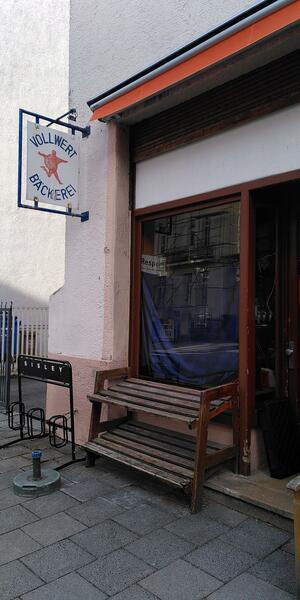
The only traditional organic bakery with the backhouse in the rear of the baker's shop I am aware of is the
Vollwert-Bäckerei K.O. Back near the Ungererbad open-air swimming pool, formerly (of hear-say: back in the 70ies) a bakers' collective, now a one-man-plus-helpers shop. Try the delicious Danish rolls and croissants which also can be obtained from a few traditional organic groceries like Hollerbusch or Ökoesel im Lebascha. The shop offers other organic food, too, so you may shop all you need for breakfast or lunch in one place.
The Munich revival of the (German) bread bakery in its traditional
sense of bakehouse and shop sharing the same address started in the posh municipality of Grünwald with Lokalbäckerei Brotzeit. These guys also run a small sales counter inside the
zero waste shop Ohne in Maxvorstadt, and frankly: No other bread in town keeps the taste
of fresh sourdough bread as long as theirs.
Others followed: The luxurious artisanal organic bread of Julius Brantner is being served at the most upmarket fine-dining restaurants in town – and you can buy it from the bakery in Schwabing. Make sure to come in time – especially on a Saturday you may find the shop closed after the last bread was sold.
If you do not succeed, try the Brotraum bakery, conveniently located near Münchner Freiheit.
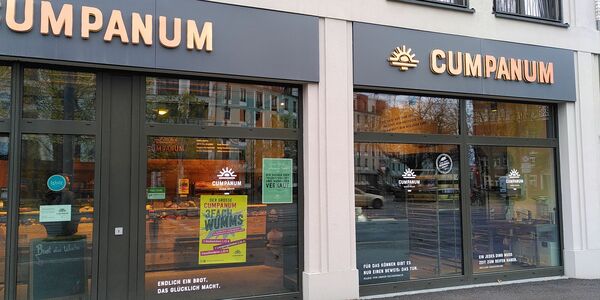
And last but not least there is an organic bakery chain with an integrated open bakehouse (run on sustainable energy) as part of the shop concept:
Cumpanum, based in the small town of Bobingen, south of Augsburg, combines a shiny bakery counter (with friendly service) with a delicatessen (and a cafe corner). If you are on your way to a Sunday brunch with friends and family and are looking for a little something you'll find hand-made organic preserves, herbs and condiments and other eatable luxury on their shelves.
"Neverending bread" may sound funny, but the master mind (and master baker) of Cumpanum and his team are also running two organic bread shops with this name,
Unendlich Brot: one in Munich's Maxvorstadt, and one in Landsberg am Lech. Also here all doughs are free from wheat.
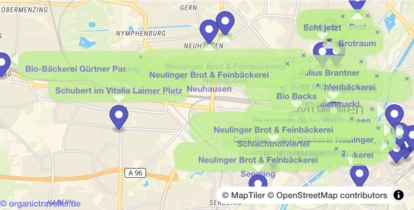
2024-02-04 22:00:00
[Munich, Trudering, Haidhausen, Maxvorstadt, Schwabing, Landsberg_am_Lech, Bobingen, organic, zero_waste, unverpackt, cafe, lunch, bakeries, butcher]
Link




























 Crossing the blue wonder bridge you'll reach Körnerplatz, and if you fancy a stroll along the river shore, turn left into historical Körnerweg which leads you towards the city centre along the embankment. A 15 minutes walk on the way you'll find
Crossing the blue wonder bridge you'll reach Körnerplatz, and if you fancy a stroll along the river shore, turn left into historical Körnerweg which leads you towards the city centre along the embankment. A 15 minutes walk on the way you'll find 










